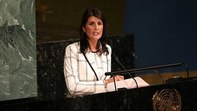23 june 2018

The General Assembly of the Presbyterian Church in the United States approved, during its meeting last week in St. Louis, Missouri, by unanimous consent, an action opposing congressional and state anti-BDS (Boycott, Divest, and Sanction) laws, according to a press release.
According to WAFA, the newly approved policy directs the Presbyterian Church (USA) to “oppose specific US legislation to suppress measures of economic witness…such as ‘The Israel Anti-Boycott Act’.”
The action further instructs the church to join in legislation opposing state anti-BDS laws through the filing of amicus curiae briefs, in coalition with other religious and human rights groups.
Some two-dozen laws have been passed, in Congress and states across the country, that are designed to suppress BDS campaigns in protest of Israel’s abuses of Palestinian human rights. The American Civil Liberties Union (ACLU) and other civil liberties groups have condemned these laws as un-constitutional and an infringement on the First Amendment right to free speech.
Earlier this year, in the first decision of its kind, a Kansas judge blocked an anti-BDS law in that state, deeming it un-constitutional. In recent years, a number of US faith groups and churches, including the Presbyterian Church (USA) have adopted boycotts and divested from companies that profit from Israel’s abuses of Palestinian human rights.
In other actions last week, the Presbyterian Church (USA) defended the free exchange of ideas on Israel/Palestine, refusing to accept a prohibition on describing the occupation of the West Bank, East Jerusalem, and Gaza as “a colonial project.” The church also, by unanimous consent, declined to censor a recent publication from its Israel/Palestine Mission Network entitled Why Palestine Matters: The Struggle to End Colonialism.
The General Assembly considered additional actions relating to Israel/Palestine including a resolution expressing “profound grief and sorrow” for the deaths of 131 Palestinians during the recent protests surrounding the Great March of Return, deploring Israel’s “targeting of more than 20 clearly marked Palestinian medics serving the wounded,” one advocating for equal rights for Palestinian citizens of Israel, and one calling on RE/MAX to stop facilitating the sale of properties in settlements built on occupied Palestinian land in violation of international law.
The Israel/Palestine Mission Network of the Presbyterian Church (USA) is a mission network of the Presbyterian Church (USA) with a mandate from the denomination’s General Assembly (2004) to work “toward specific mission goals that will create currents of wider and deeper involvement with Israel/Palestine.”
According to WAFA, the newly approved policy directs the Presbyterian Church (USA) to “oppose specific US legislation to suppress measures of economic witness…such as ‘The Israel Anti-Boycott Act’.”
The action further instructs the church to join in legislation opposing state anti-BDS laws through the filing of amicus curiae briefs, in coalition with other religious and human rights groups.
Some two-dozen laws have been passed, in Congress and states across the country, that are designed to suppress BDS campaigns in protest of Israel’s abuses of Palestinian human rights. The American Civil Liberties Union (ACLU) and other civil liberties groups have condemned these laws as un-constitutional and an infringement on the First Amendment right to free speech.
Earlier this year, in the first decision of its kind, a Kansas judge blocked an anti-BDS law in that state, deeming it un-constitutional. In recent years, a number of US faith groups and churches, including the Presbyterian Church (USA) have adopted boycotts and divested from companies that profit from Israel’s abuses of Palestinian human rights.
In other actions last week, the Presbyterian Church (USA) defended the free exchange of ideas on Israel/Palestine, refusing to accept a prohibition on describing the occupation of the West Bank, East Jerusalem, and Gaza as “a colonial project.” The church also, by unanimous consent, declined to censor a recent publication from its Israel/Palestine Mission Network entitled Why Palestine Matters: The Struggle to End Colonialism.
The General Assembly considered additional actions relating to Israel/Palestine including a resolution expressing “profound grief and sorrow” for the deaths of 131 Palestinians during the recent protests surrounding the Great March of Return, deploring Israel’s “targeting of more than 20 clearly marked Palestinian medics serving the wounded,” one advocating for equal rights for Palestinian citizens of Israel, and one calling on RE/MAX to stop facilitating the sale of properties in settlements built on occupied Palestinian land in violation of international law.
The Israel/Palestine Mission Network of the Presbyterian Church (USA) is a mission network of the Presbyterian Church (USA) with a mandate from the denomination’s General Assembly (2004) to work “toward specific mission goals that will create currents of wider and deeper involvement with Israel/Palestine.”
21 june 2018
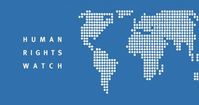
Human Rights Watch has condemned the United States government’s decision to withdraw from the United Nations Human Rights Council, saying this is a sign of the country’s unwillingness to protect human rights.
“The US has been threatening to walk away from the Human Rights Council ever since President Trump came into office, so this decision comes as no surprise,” said Kenneth Roth, executive director of Human Rights Watch. “Trump has decided that ‘America First’ means ignoring the suffering of civilians in Syria and ethnic minorities in Myanmar at the United Nations.”
“The Trump administration’s withdrawal from the Human Rights Council is a sad reflection of its one-dimensional human rights policy in which the US defends Israeli abuses from criticism above all else,” Roth said. “By walking away, the US is turning its back not just on the UN, but on victims of human rights abuses around the world, including in Syria, Yemen, North Korea and Myanmar. Now other governments will have to redouble their efforts to ensure that the council addresses the world’s most serious human rights problems.”
The US is withdrawing from the United Nations human rights council, the Trump administration announced on Tuesday, calling it a “cesspool of political bias” that targets Israel in particular while ignoring atrocities in other countries.
The US ambassador to the UN, Nikki Haley, claimed that she had traveled to the council’s headquarters in Geneva a year ago to call for reforms, to no avail.
“When a so-called human rights council cannot bring itself to address the massive abuses in Venezuela and Iran, and it welcomes the Democratic Republic of Congo as a new member, the council ceases to be worthy of its name,” the ambassador said.
Haley also pointed to the continued existence of “agenda item 7”, a permanent fixture on the schedule, exclusively devoted to the discussion of rights violations in the occupied West Bank and the blockaded Gaza Strip.
The US has long criticized the Human Rights Council for its standing agenda item 7 on rights violations by all parties in the Occupied Palestinian Territories. This item was included when the council’s agenda was drawn up at the conclusion of its initial year, in 2007, at a time when the US had decided not to participate in the council.
“The US has actively campaigned for removing agenda item 7, and has opposed resolutions dealing with the Occupied Palestinian Territories, even when not presented under this agenda item, such as a recent Special Session resolution creating an inquiry into violence in Gaza,” said Human Rights Watch.
The Human Rights Council was created by the UN General Assembly in 2006 as the UN’s top human rights body. While it has its shortcomings – including the participation of persistent rights violators such as Israel – the council plays a vital role in addressing serious rights abuses around the world. It has initiated investigations into rights violations in Syria, Yemen, Burundi, Myanmar, and the occupied Palestinian territories, and addresses key topics such as migration, counterterrorism and protecting people with disabilities, and others from violence and discrimination.
“The US has been threatening to walk away from the Human Rights Council ever since President Trump came into office, so this decision comes as no surprise,” said Kenneth Roth, executive director of Human Rights Watch. “Trump has decided that ‘America First’ means ignoring the suffering of civilians in Syria and ethnic minorities in Myanmar at the United Nations.”
“The Trump administration’s withdrawal from the Human Rights Council is a sad reflection of its one-dimensional human rights policy in which the US defends Israeli abuses from criticism above all else,” Roth said. “By walking away, the US is turning its back not just on the UN, but on victims of human rights abuses around the world, including in Syria, Yemen, North Korea and Myanmar. Now other governments will have to redouble their efforts to ensure that the council addresses the world’s most serious human rights problems.”
The US is withdrawing from the United Nations human rights council, the Trump administration announced on Tuesday, calling it a “cesspool of political bias” that targets Israel in particular while ignoring atrocities in other countries.
The US ambassador to the UN, Nikki Haley, claimed that she had traveled to the council’s headquarters in Geneva a year ago to call for reforms, to no avail.
“When a so-called human rights council cannot bring itself to address the massive abuses in Venezuela and Iran, and it welcomes the Democratic Republic of Congo as a new member, the council ceases to be worthy of its name,” the ambassador said.
Haley also pointed to the continued existence of “agenda item 7”, a permanent fixture on the schedule, exclusively devoted to the discussion of rights violations in the occupied West Bank and the blockaded Gaza Strip.
The US has long criticized the Human Rights Council for its standing agenda item 7 on rights violations by all parties in the Occupied Palestinian Territories. This item was included when the council’s agenda was drawn up at the conclusion of its initial year, in 2007, at a time when the US had decided not to participate in the council.
“The US has actively campaigned for removing agenda item 7, and has opposed resolutions dealing with the Occupied Palestinian Territories, even when not presented under this agenda item, such as a recent Special Session resolution creating an inquiry into violence in Gaza,” said Human Rights Watch.
The Human Rights Council was created by the UN General Assembly in 2006 as the UN’s top human rights body. While it has its shortcomings – including the participation of persistent rights violators such as Israel – the council plays a vital role in addressing serious rights abuses around the world. It has initiated investigations into rights violations in Syria, Yemen, Burundi, Myanmar, and the occupied Palestinian territories, and addresses key topics such as migration, counterterrorism and protecting people with disabilities, and others from violence and discrimination.
20 june 2018
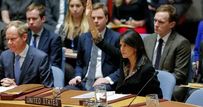
Israeli premier Benjamin Netanyahu welcomed the US administration’s withdrawal from membership of the UN Human Rights Council on Tuesday over what it labeled as a bias against Israel and a lack of reform.
In a statement released by his office, Israeli premier Benjamin Netanyahu hailed the US move, branding the council “a biased, hostile, anti-Israel organization that has betrayed its mission of protecting human rights.”
“Israel thanks president Trump, secretary Pompeo and ambassador Haley for their courageous decision against the hypocrisy and the lies of the so-called UN Human Rights Council,” the statement said.
Israeli ambassador to the UN Danny Danon also welcomed the US step, saying in a statement that the US “has proven, yet again, its commitment to truth and justice and its unwillingness to allow the blind hatred of Israel in international institutions to stand unchallenged.”
“The Human Rights Council has long been the foe of those who truly care about human rights around the world,” Danon said.
In a statement released by his office, Israeli premier Benjamin Netanyahu hailed the US move, branding the council “a biased, hostile, anti-Israel organization that has betrayed its mission of protecting human rights.”
“Israel thanks president Trump, secretary Pompeo and ambassador Haley for their courageous decision against the hypocrisy and the lies of the so-called UN Human Rights Council,” the statement said.
Israeli ambassador to the UN Danny Danon also welcomed the US step, saying in a statement that the US “has proven, yet again, its commitment to truth and justice and its unwillingness to allow the blind hatred of Israel in international institutions to stand unchallenged.”
“The Human Rights Council has long been the foe of those who truly care about human rights around the world,” Danon said.
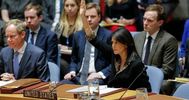
The United States administration declared their withdrawal from the UN Human Rights council on Tuesday, accusing it of anti-Israel bias. Niki Haley, US ambassador to the UN, described the body as a “cesspool of political bias” because of its focus on human rights abuses in West Bank and Gaza.
She claimed that Israel had a “positive human rights record” and was being used as a “scapegoat” to cover up for member states like the Democratic Republic of Congo, who, according to her, have committed far worse atrocities.
The Trump administration has been threatening to leave the body for months, but the fact that the final decision to leave coincides with attention on both America’s own human rights abuses (such as treatment of immigrants at the US-Mexico border) and those of Israel, America’s close ally, have made many commentators believe that the US has need to discredit the institution.
Several countries have also accused the council of bias against Israel (notably Boris Johnson, UK foreign secretary), but the USA has been the only country to leave.
The Palestinian Ministry of Foreign Affairs and Expatriates issued a statement in response, saying, “The withdrawal of the United States from the Human Rights Council exposes the extent to which this Administration is willing to go to shield Israel, the occupying Power from accountability.”
The statement rejected claims of pro-Israel bias, saying the council was only “attempting to do its job in relation to Palestinian human rights,” accusing Trump’s administration of “bias against Palestinian rights” and “supporting the illegal Israeli colonial agenda.”
The statement, according to the PNN, also warned of the risk that this development will “embolden Israel to persist in its egregious human rights violations” and called on the Council to “show increasing commitment to respect and ensure respect for human rights and international law in the Occupied Palestinian Territory, including East Jerusalem,” concluding by affirming that “Palestine is not and will not be the exception to the law, despite the cynical attempts to that end.”
She claimed that Israel had a “positive human rights record” and was being used as a “scapegoat” to cover up for member states like the Democratic Republic of Congo, who, according to her, have committed far worse atrocities.
The Trump administration has been threatening to leave the body for months, but the fact that the final decision to leave coincides with attention on both America’s own human rights abuses (such as treatment of immigrants at the US-Mexico border) and those of Israel, America’s close ally, have made many commentators believe that the US has need to discredit the institution.
Several countries have also accused the council of bias against Israel (notably Boris Johnson, UK foreign secretary), but the USA has been the only country to leave.
The Palestinian Ministry of Foreign Affairs and Expatriates issued a statement in response, saying, “The withdrawal of the United States from the Human Rights Council exposes the extent to which this Administration is willing to go to shield Israel, the occupying Power from accountability.”
The statement rejected claims of pro-Israel bias, saying the council was only “attempting to do its job in relation to Palestinian human rights,” accusing Trump’s administration of “bias against Palestinian rights” and “supporting the illegal Israeli colonial agenda.”
The statement, according to the PNN, also warned of the risk that this development will “embolden Israel to persist in its egregious human rights violations” and called on the Council to “show increasing commitment to respect and ensure respect for human rights and international law in the Occupied Palestinian Territory, including East Jerusalem,” concluding by affirming that “Palestine is not and will not be the exception to the law, despite the cynical attempts to that end.”
13 june 2018
Kuwait tried to pass earlier this month a similar resolution at the UN Security Council, which condemned Israel for using "excessive force" against the Palestinians and called for a UN protection force to defend Gazans. However, it was vetoed by the United States.
Washington then presented its own resolution calling on the council to condemn Hamas. The resolution failed to pass, but focused the discussion on Hamas's activities.
Haley scorned the members of the General Assembly for attempting to score political points back home by ganging up on Israel, but accused them of only furthering the prospect of peace between Israel and the Palestinians.
“Gaza is an important international matter. But what makes it different and more urgent than conflicts in Nicaragua, Iran, Yemen, Burma or many other desperate places? Because we haven’t gathered here to discuss any of these urgent issues. The United States would welcome that,” she said.
“What makes Gaza different for some is that attacking Israel is their favorite political sport. That’s why we’re here today.”
“It is totally one-sided. It makes not one mention of Hamas who routinely initiates violence in Gaza. Such one-sided resolutions at the UN do nothing to advance peace between Israel and the Palestinians. Everyone recognizes that,” she continued, accusing the members of engaging in “pure politics.”
Addressing the General Assembly, Israeli Ambassador Danny Danon also slammed accused the body of “empowering Hamas” if it supported the resolution.
“I am here today to stand up for a basic right, the right afforded to every country in the world. The right to defend its citizens,” Danon began in his speech,
The resolution, he charged, was “the international community’s attempt to take away our basic right to defend itself.”
“By supporting this resolution, you are colluding with a terrorist organization. By supporting this resolution, you are empowering Hamas,” he said.
Urging countries to read the resolution, which makes no mention of Hamas, Danon asked: “Do you support terrorism? Do you support suicide bombers?”
Algerian Ambassador Sabri Boukadoum, representing Arab nations, first sought to block a vote on a US amendment to condemn Hamas, saying it wasn't relevant to the resolution. He said it also undermined reconciliation efforts between rival Palestinian factions Hamas and Fatah as well as the "remote prospects" of reviving peace negotiations with Israel.
His motion to take "no action" on the amendment was defeated by a vote of 59-78 with 26 abstentions, allowing the US amendment to be put to a vote.
The US amendment was approved by a 62-58 vote, with 42 abstentions. But General Assembly President Miroslav Lajcak declared that under an assembly rule, a two-thirds majority was needed so the amendment failed.
Haley appealed, citing another rule that says only a majority vote was required. After a short break, Lajcak put the US appeal to a vote. The US narrowly lost that vote 66-73 with 26 abstentions.
Finally, the assembly voted on the original Palestinian-backed resolution, approving it 120-8 with 45 abstentions.
Haley said in a statement afterward that "in the face of Hamas terrorists routinely inciting violence ... today the UN made the morally bankrupt judgment that the recent Gaza violence is all Israel's fault."
"But the common practice of turning a blind eye to the UN's anti-Israel bias is changing," she said. "Today, a plurality of 62 countries voted in favor of the US-led effort to address Hamas' responsibility for the disastrous conditions in Gaza."
Israel's ambassador accused "anti-Israel elements" of blocking condemnation of Hamas.
"This was a badge of shame for the UN," Danon said. But "thanks to the combined efforts with our American friends and our allies from around the world, we proved today that the automatic majority against Israel in the UN is not destiny and can be changed."
Palestinian Ambassador Riyad Mansour urged the assembly before the vote to address the escalating violence in Gaza and "the crisis" of protecting civilians. He called the US amendment a "bad-faith attempt" to shift the focus away from "the core objective of protecting civilians and upholding international law."
"We need action. We need protection for our civilian population. ... Is that a crime to ask for?" he said.
"We cannot remain silent in the face of the most violent crimes and human rights violations being systematically perpetrated against our people," Mansour said.
The resolution deplores "any excessive use of force" by Israeli forces, particularly in Gaza, and demands that Israel "refrain from such actions." It "deplores the firing of rockets from the Gaza Strip against Israeli civilian areas," but doesn't say who is doing the firing.
After the vote, Prime Minister Benjamin Netanyahu issued a statement thanking US President Donald Trump's support for Israel in the UN.
"Israel appreciates the Trump administration’s steadfast support for Israel at the United Nations and Ambassador Haley’s strong statement today exposing the hypocrisy of the UN’s bias against Israel," a statement from the Prime Minster's Office said.
"The UN’s incessant focus on Israel not only brings shame to the organization. It also draws attention away from so many other pressing issues that demand the attention of the international community," it continued.
"As for Gaza, Hamas is responsible for the terrible situation there and for the loss of life and suffering that has occurred as a result of the violent riots it has instigated over the last few weeks."
Rather than improve the lives of the people of Gaza, it added, "Hamas is using the civilian Palestinian population as human shields in its unremitting terror war against Israel."
Palestinian Authority President Mahmoud Abbas was also blamed by Netanyahu for making matters in Gaza worse. He "has only made the humanitarian situation in Gaza worse by reducing payments of salaries to Gaza and by refusing to pay for electricity provided to Gaza," the statement charged.
"While Israel will continue to defend itself and protect the security of its citizens, Israel will continue to seek ways to improve the humanitarian situation in Gaza. The people of Gaza are not our enemy. Hamas is."
Washington then presented its own resolution calling on the council to condemn Hamas. The resolution failed to pass, but focused the discussion on Hamas's activities.
Haley scorned the members of the General Assembly for attempting to score political points back home by ganging up on Israel, but accused them of only furthering the prospect of peace between Israel and the Palestinians.
“Gaza is an important international matter. But what makes it different and more urgent than conflicts in Nicaragua, Iran, Yemen, Burma or many other desperate places? Because we haven’t gathered here to discuss any of these urgent issues. The United States would welcome that,” she said.
“What makes Gaza different for some is that attacking Israel is their favorite political sport. That’s why we’re here today.”
“It is totally one-sided. It makes not one mention of Hamas who routinely initiates violence in Gaza. Such one-sided resolutions at the UN do nothing to advance peace between Israel and the Palestinians. Everyone recognizes that,” she continued, accusing the members of engaging in “pure politics.”
Addressing the General Assembly, Israeli Ambassador Danny Danon also slammed accused the body of “empowering Hamas” if it supported the resolution.
“I am here today to stand up for a basic right, the right afforded to every country in the world. The right to defend its citizens,” Danon began in his speech,
The resolution, he charged, was “the international community’s attempt to take away our basic right to defend itself.”
“By supporting this resolution, you are colluding with a terrorist organization. By supporting this resolution, you are empowering Hamas,” he said.
Urging countries to read the resolution, which makes no mention of Hamas, Danon asked: “Do you support terrorism? Do you support suicide bombers?”
Algerian Ambassador Sabri Boukadoum, representing Arab nations, first sought to block a vote on a US amendment to condemn Hamas, saying it wasn't relevant to the resolution. He said it also undermined reconciliation efforts between rival Palestinian factions Hamas and Fatah as well as the "remote prospects" of reviving peace negotiations with Israel.
His motion to take "no action" on the amendment was defeated by a vote of 59-78 with 26 abstentions, allowing the US amendment to be put to a vote.
The US amendment was approved by a 62-58 vote, with 42 abstentions. But General Assembly President Miroslav Lajcak declared that under an assembly rule, a two-thirds majority was needed so the amendment failed.
Haley appealed, citing another rule that says only a majority vote was required. After a short break, Lajcak put the US appeal to a vote. The US narrowly lost that vote 66-73 with 26 abstentions.
Finally, the assembly voted on the original Palestinian-backed resolution, approving it 120-8 with 45 abstentions.
Haley said in a statement afterward that "in the face of Hamas terrorists routinely inciting violence ... today the UN made the morally bankrupt judgment that the recent Gaza violence is all Israel's fault."
"But the common practice of turning a blind eye to the UN's anti-Israel bias is changing," she said. "Today, a plurality of 62 countries voted in favor of the US-led effort to address Hamas' responsibility for the disastrous conditions in Gaza."
Israel's ambassador accused "anti-Israel elements" of blocking condemnation of Hamas.
"This was a badge of shame for the UN," Danon said. But "thanks to the combined efforts with our American friends and our allies from around the world, we proved today that the automatic majority against Israel in the UN is not destiny and can be changed."
Palestinian Ambassador Riyad Mansour urged the assembly before the vote to address the escalating violence in Gaza and "the crisis" of protecting civilians. He called the US amendment a "bad-faith attempt" to shift the focus away from "the core objective of protecting civilians and upholding international law."
"We need action. We need protection for our civilian population. ... Is that a crime to ask for?" he said.
"We cannot remain silent in the face of the most violent crimes and human rights violations being systematically perpetrated against our people," Mansour said.
The resolution deplores "any excessive use of force" by Israeli forces, particularly in Gaza, and demands that Israel "refrain from such actions." It "deplores the firing of rockets from the Gaza Strip against Israeli civilian areas," but doesn't say who is doing the firing.
After the vote, Prime Minister Benjamin Netanyahu issued a statement thanking US President Donald Trump's support for Israel in the UN.
"Israel appreciates the Trump administration’s steadfast support for Israel at the United Nations and Ambassador Haley’s strong statement today exposing the hypocrisy of the UN’s bias against Israel," a statement from the Prime Minster's Office said.
"The UN’s incessant focus on Israel not only brings shame to the organization. It also draws attention away from so many other pressing issues that demand the attention of the international community," it continued.
"As for Gaza, Hamas is responsible for the terrible situation there and for the loss of life and suffering that has occurred as a result of the violent riots it has instigated over the last few weeks."
Rather than improve the lives of the people of Gaza, it added, "Hamas is using the civilian Palestinian population as human shields in its unremitting terror war against Israel."
Palestinian Authority President Mahmoud Abbas was also blamed by Netanyahu for making matters in Gaza worse. He "has only made the humanitarian situation in Gaza worse by reducing payments of salaries to Gaza and by refusing to pay for electricity provided to Gaza," the statement charged.
"While Israel will continue to defend itself and protect the security of its citizens, Israel will continue to seek ways to improve the humanitarian situation in Gaza. The people of Gaza are not our enemy. Hamas is."
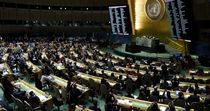
The UN General Assembly is set to vote on Wednesday on a draft resolution condemning the latest Israeli crimes in the besieged Gaza Strip.
The Arab Member States submitted the draft resolution to the UN General Assembly after it was vetoed by Washington at the Security Council.
The draft calls for taking the necessary measures to protect the Palestinian civilians in Gaza after 129 Palestinians have been killed by the Israeli army since the Great March of Return started on 30th March.
Permanent observer of Palestine to the UN Riyad Masnour last Friday announced that the UN General Assembly will hold an emergency session soon on providing international protection for Palestinians in the occupied territories.
Mansour said that a new draft resolution, similar to the Kuwait-drafted one which was blocked by Washington in early June, will be presented in the meeting.
Earlier in June, the US vetoed a draft resolution submitted by Kuwait to the Security Council calling for providing international protection to the Palestinian civilians in Gaza.
Another draft resolution condemning Hamas movement was presented by the US and rejected by the Security Council members.
The Palestinians hope that they win as many votes as possible as they did in the January vote held against the US president Donald Trump' decision to move the US embassy from Tel Aviv to Jerusalem. Trump's decision received 9 votes in favor and 128 against.
The Arab Member States submitted the draft resolution to the UN General Assembly after it was vetoed by Washington at the Security Council.
The draft calls for taking the necessary measures to protect the Palestinian civilians in Gaza after 129 Palestinians have been killed by the Israeli army since the Great March of Return started on 30th March.
Permanent observer of Palestine to the UN Riyad Masnour last Friday announced that the UN General Assembly will hold an emergency session soon on providing international protection for Palestinians in the occupied territories.
Mansour said that a new draft resolution, similar to the Kuwait-drafted one which was blocked by Washington in early June, will be presented in the meeting.
Earlier in June, the US vetoed a draft resolution submitted by Kuwait to the Security Council calling for providing international protection to the Palestinian civilians in Gaza.
Another draft resolution condemning Hamas movement was presented by the US and rejected by the Security Council members.
The Palestinians hope that they win as many votes as possible as they did in the January vote held against the US president Donald Trump' decision to move the US embassy from Tel Aviv to Jerusalem. Trump's decision received 9 votes in favor and 128 against.
9 june 2018
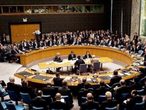
The United Nations General Assembly is scheduled to hold what was described as an “urgent meeting,” next Wednesday, to discuss the Israeli escalation against the Palestinian protesters in the Gaza Strip.
General Assembly President Miroslav Lajcak sent a letter for the 193 member states, informing them of the scheduled meeting, the Maan News Agency has reported.
The assembly will be voting on a draft proposal condemning Israel for its ongoing violations against the nonviolent protesters in the Gaza Strip.
The vote is like the one which was submitted by Kuwait, last week, asking for providing the Palestinians with international protection but was struck down by a Veto from the United States, Palestinian UN ambassador Riyad Mansour said.
Mansour added that the ongoing Israeli escalation, and the repeated excessive use of fatal force against unarmed protesters, requires the International Community to act, and provide the urgently-needed protection to the Palestinian people.
During last week’s vote, the United States was the only country that opposed it, by using its Veto power, while ten countries of the 15-member council, voted for the resolution, and four others abstained.
|Dr. Ashrawi: “US Veto Absolute Proof Of Moral Corruption”|
General Assembly President Miroslav Lajcak sent a letter for the 193 member states, informing them of the scheduled meeting, the Maan News Agency has reported.
The assembly will be voting on a draft proposal condemning Israel for its ongoing violations against the nonviolent protesters in the Gaza Strip.
The vote is like the one which was submitted by Kuwait, last week, asking for providing the Palestinians with international protection but was struck down by a Veto from the United States, Palestinian UN ambassador Riyad Mansour said.
Mansour added that the ongoing Israeli escalation, and the repeated excessive use of fatal force against unarmed protesters, requires the International Community to act, and provide the urgently-needed protection to the Palestinian people.
During last week’s vote, the United States was the only country that opposed it, by using its Veto power, while ten countries of the 15-member council, voted for the resolution, and four others abstained.
|Dr. Ashrawi: “US Veto Absolute Proof Of Moral Corruption”|
